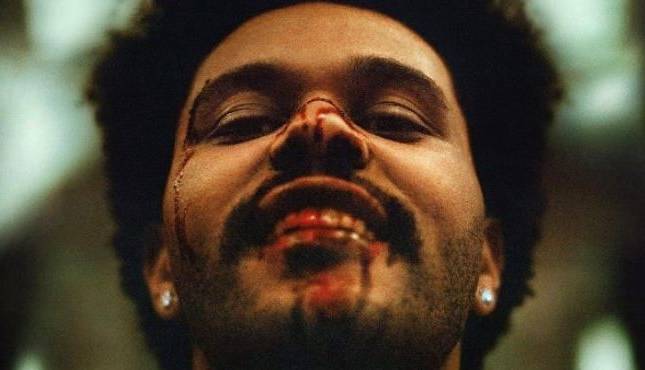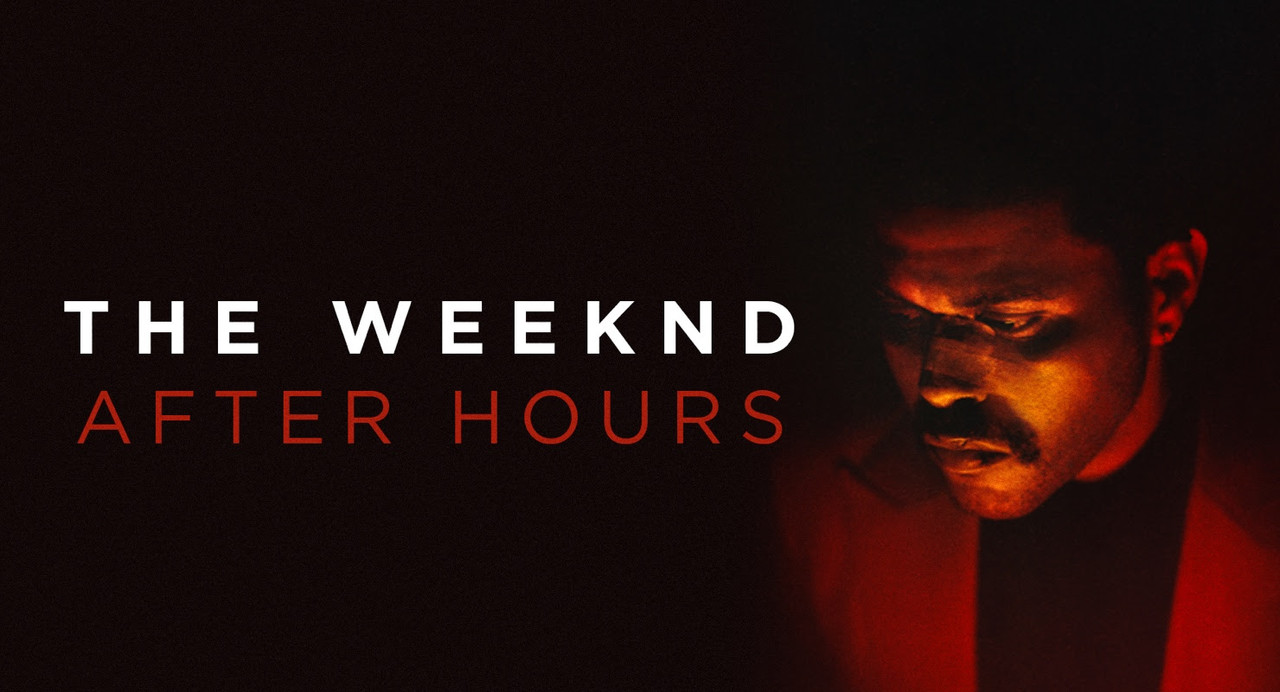music / Reviews
The Weeknd – After Hours Review


It would be foolish to call Abel Makkonen Tesfaye, aka The Weeknd, anything other than an outright success story, but beneath the surface there is a nagging sense that, in spite of his gargantuan sales, unimpeachable hits and routinely brilliant vocal performances, that the Canadian lothario hasn’t quite lived up to his potential. This is no doubt the result of implausibly lofty expectations. Abel took our breath away at the outset when he dropped the House Of Balloons mixtape in 2011. Out of the blue, we were sucked into a sordid backroom world of narcotic induced bliss and sexual paranoia. The Weeknd was promising listeners the height of ecstasy even as they drowned in slow motion. His was a world of pure hedonistic nihilism; it was amoral and utterly enlivening.
In 2011 he was like no one else. He may have mirrored the fame induced depression of first Drake and later Post-Malone, but The Weeknd never sought sympathy. He was a victim and a vampire of his own insatiable lust, more interested in torturing his own psyche than trying to justify his actions. When House Of Balloons blossomed into a stunning trilogy of mixtapes, the world fell at his feet. Abel headlined arenas across the globe without releasing conventional singles and he earned praise from even harshest of critics. The whispers began to gather pace, could the simultaneous heir to MJ, D’Angelo and R Kelly’s R&B mantle arrived?
The answer was a heavily qualified yes. Frank Ocean quickly surpassed The Weeknd as R&B’s definitive auteur hitmaker while Abel struggled to find his footing between artistic experimentation and globe-straddling hitmaking. His official debut album, Kiss Land, was a monumental disappointment despite showing admirable ambition. He soon corrected course of the chart-busting Beauty Behind The Madness. A pattern soon emerged. The Weeknd could turn his murky, morally-ambiguous sound to either hit-making or experimentation, but he struggled to do both at once. 2016’s Daft Punk assisted Starboy injected both an electric and nostalgic pulse to Abel’s sardonic soundscapes without ever really surpassing a slick, middling pleasantness. If that album looked outward, then My Dear Melancholy turned back in on itself as Abel tried to reckon with the steamy desperation of his original trilogy.
From the outside looking in, The Weeknd appeared both inspired and lost in equal measure. He could have rinsed and repeated the brilliant Beauty Behind The Madness formula for years to come, but he continues to strive to capture the shock of the new and the dark psychosis of his original trilogy. In this light, After Hours feels like a staggering breakthrough. The age of one or the other, experimentation or safety, is over. The Weeknd’s fourth studio album is not without its flaws, but it does represent the first time that Abel has managed to fold his electronic and new wave influences seamlessly into the dark repugnance of Trilogy and the airwave ascendency of Beauty Behind The Madness.
The Weeknd’s new album is deep, dark, painfully shallow, murkily ambiguous and seductively sleek. The mess of contradictions that have come to define his career are not only sitting side-by-side, they are proving strangely complimentary as his nihilistic moments are cast in stark relief by the shimmering pop theatricality he learned on Starboy. “Faith” sets the tone. Brooding, torturous and angelically sung, the track could be a typically sensual stew of self-loathing hedonism, but rather than staying submerged, the track blossoms through a preposterous 80s power pop bridge (which sees Abel double tracked in a fashioned that recalls Gilbert & Sullivan of all people) before unleashing a sultry falsetto false-chorus. It should be the grand “light breaking through the clouds” moment – and tonal it is – but the lyrics are so horrifically bleak: “If I ODed, I want you to O.D. right beside me”. Is this is what passes for a grand romantic gesture from The Weeknd point of view? The thing is, he isn’t posturing; self-loathing exudes from every corner of this track. He hurts women, he tortures himself, but he cannot change – he falls back into the same traps over and over and over again. If Abel has a mantra it is this:
“It’s fine for me to go back to my old ways, don’t you cry for me/Thought I’d be a better man, but I lied to me and to you”.
This is The Weeknd’s grand vision and he is utterly sincere. In the moment he is in love: he’s high as a kite, lost in sweat soaked, sordid fucking and he promises the world to his lover and himself, but then he wakes up, sobers up and leaves. He is coming apart at the seams while having the time of his life, everytime he finds something worth clinging to, he throws it away for another back alley, pill assisted lay.
Fittingly, After Hours is about both caring and control. Abel has no self-control, no ability to resist his impulses and this would not be a problem were he not so romantic and dependent. He can’t just be a notorious no-strings-attached Casanova, because he craves the kind of deep connections and sense of security that he routinely throws away. He puts it bluntly on the brilliant Aha inspired synth pop of “Blinding Lights”. “Maybe you can show me how to love, maybe/I’m going through withdrawals…I can’t sleep until I feel your touch” – the trouble is that, whether separated or together, The Weeknd cannot contain his libido. Like Leonard Cohen before him, the wretched beast will not be tamed, especially when he’s surrounded by temptation (“Sin City’s cold and empty, no one’s around to judge me…I’m drowning in the light”).
Turnabout is fair play and The Weeknd is forced to swallow a bitter pill on the sublimely noir misery of “Escape From LA”. His partner, it would seem, is just as susceptible to temptation and indiscretion as Abel himself. Both he and Gigi Hadid are hurting, helpless and strangely matter of fact: “You pillow talk to me about the men who try to get in between us”. There is a mutual understanding of their own weakness and Abel is not looking for the moral high ground (“Man, these hoes will find a way, ‘caus when I’m on the liquor, I go crazy”). Rather than resolving to do better or be truer, they instead accept their very weakness and seek to remove themselves from temptation on a willowy and beautifully pitched chorus: “This place will be the end of me, take me out of LA” (just don’t go to Las Vegas instead, eh Abel?). The track would work beautifully as a meditation of carnal misery, but instead “Escape From LA” vibes outward into a strangely intoxicating stream of conscious that sees Abel detailing a sordid fuck in the studio and riffing on his valley girl seductresses (“LA girls all look the same, I can recognize the same work done on they face, I don’t criticize”).
Sadly, the same lurid shifting sands subtlety could not be repeated on “Heartless”. The track provides the natural and logical follow up. Despite plenty of psychological torment that speaks to the contrary, The Weeknd acknowledges that he is an uncaring monster dragged from one disaster to the next by his throbbing member. “I’ve been running through the pussy…why? Cause I’m heartless”: it should be the perfect moment of self-excoriation and it does work as a piece of narrative theatre, but the track itself is underpowered, a rinse and repeat of old sonics topped off with a repetitive and unimaginative chorus. This crucial moment of self-diagnosis deserved better.
Luckily, for every misstep there are three or four sublime slices of toxic predatory pop. Album opener “Alone Again” shimmers both seductively and sorrowfully, as The Weeknd demands that his “little heart” be broken before self-destructively throwing up a wad full of ones at the strip club. Rather than setting the album off, The Weeknd sucks us down into the depths of depression. He both deserves to be “Alone Again”, but fears that he won’t be able to cope, that he’ll fall back down into the same hole he’s been stuck in for years. Illangelo does a masterful job on production; his electronics conjure both the gleaming skyline and propulsive heartbeat of Los Angeles and the dark ambiguity of a man alone, slowly coming apart at the seams.
Despite existing under a dark electronic cloud, the contrasts within After Hours’ sonic palette are quite something to behold. “Hardest To Love” employs the softest and sweetest glimmers of 80s pop for one of the album’s most tender moments. In his mind, The Weeknd deserves to be abandoned even as he clings to the most precious memories of his lover, but far from rejecting him, she still turns to him for comfort, advice and honesty (“I can’t believe you trust me, after all the rough days, you still call me up”). It’s hard to understate just how angelic Abel’s vocal proves on the album’s conflicted, but tender opening suite. “Scared To Live”, with its Phil Collins drum roll and cheeky nod to Elton John, is perhaps Abel’s high point as a pure pop vocalist.
An expert at twisting the knife, The Weeknd often uses the most sugary and uplifting arrangements for his darkest material. “Save Your Tears” is a teen pop dream of a composition, but Abel’s lyrics provide only a callous warning. He will hurt you: he will cheat, he will leave and he will not support you, so “save your tears for another day”. It’s a brutal punch to the gut disguised as a sugary skip through the fairground’s fairy lights.
Unfortunately, at 56 minutes in length After Hours has a nasty tendency to drift and repeat themes that had been better expressed several times before. The album feels bloated and that is a shame as there are no outright duds, just a gathering sense of inertia as The Weeknd wallows in his own, self-created, mire. The bigger tragedy is that the stunning six-minute title track is nearly lost to the attritional nature of the listening experience. Hopefully the audience perseveres, because “After Hours” is a spell binding summation of everything that makes The Weeknd great: a true updating of the Trilogy aesthetic, Abel is afforded plenty of space and precious silence to be suffocated by his psyche. Is this is what his life is like when he is truly alone with no warm bodies to fuck or lover to cradle him? Just silence, a thudding heartbeat and a desperate longing for somebody (anybody!) from his past to care for him. The silence is soon broken by a driving groove and a heavenly falsetto that sees The Weeknd torn between callous instinct (“I turned into the man I used to be”) and wounded man we know today (“Where are you now, when I need you most? I’d give it all just to hold you close…I’ll treat you better than I did before…This time, I won’t break your heart”).
After Hours isn’t perfect, but it is an incredible feat of reconciliation. From the songwriting to the stellar compositions, The Weeknd has managed to reconcile all the contradictions of his psyche and sound in one record. Better still, he explains with both lyrics and texture how these conflicts emerge in the first place: he is weak and he is tortured, forever pulled in two direction between the man he is and the man he wants to be. Remarkably, while harmonizing the sounds of Trilogy, Starboy and Beauty Behind The Madness, Abel manages to bring fresh influences (new wave, synth pop) into the fold. It should be a mess – and psychologically speaking, it most certainly is – but After Hours is a divinely dark and torturous pop record, the perfect representation of its conflicted creator.










